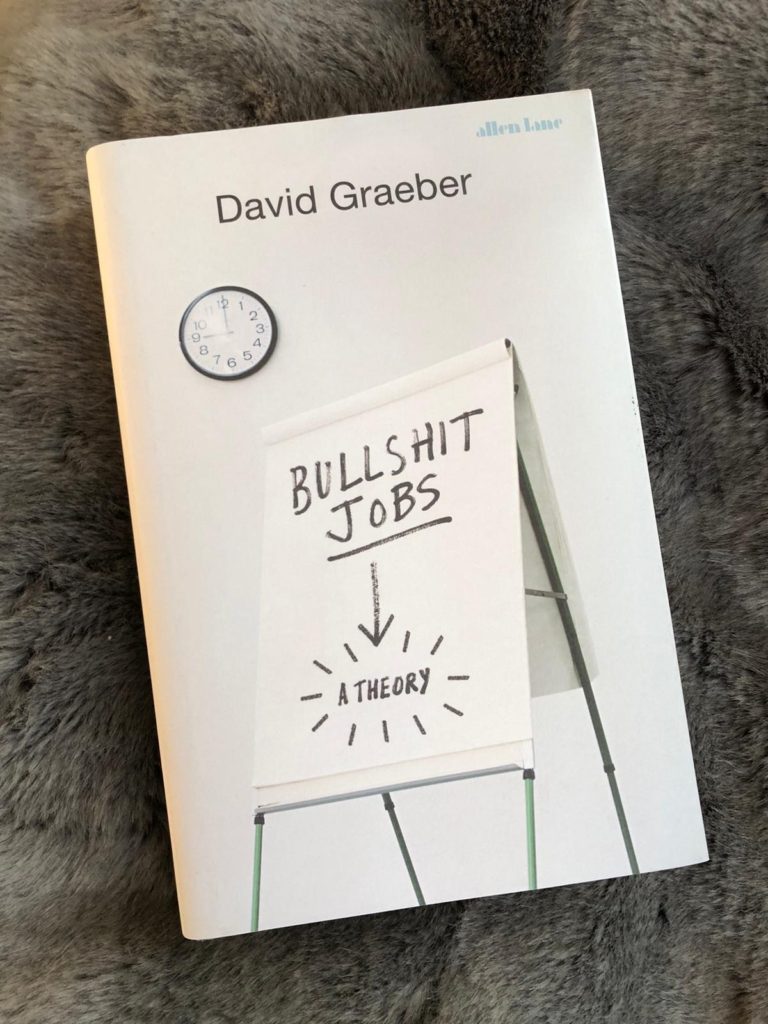A Psychologist’s Take on Bullshit Jobs
Book review – Bullshit Jobs: A Theory
Overall rating: 3.5/5
Review in short: This book uniquely identifies a very relevant problem within our society – people doing work they believe to be meaningless. Some will relate to this more than others, depending on the jobs they’ve had, but it poses some interesting ideas and questions. The book is very weak in terms of data that would support the author’s arguments, but if you are able to move beyond that, it’s an overall interesting read.
Ideal for: Anyone that’s ever felt their job has no purpose. And anyone interested in how meaningful work, or lack thereof, impacts people’s well being and the society as a whole.
Key topics: jobs, universal income, well being,
In Lost Connections, Johann Hari portrays disconnection from meaningful work as one of the key causes of depression in today’s world. In Bullshit Jobs, David Graeber proposes that as much as 40% of people believe their jobs lack meaning. How is this possible? And what consequences does it have on our well-being?

Defining ‘bullshit’ jobs
While countless hours could be spent arguing whether a specific role is ‘bullshit’ or not, David circumvents this by defining bullshit jobs as jobs that are so meaningless that even the jobholders themselves are unable to justify their existence, even though they feel obligated to pretend otherwise.
One could of course argue that the subjective interpretation of meaningfulness does not necessarily correlate with actual meaning. For impact on individuals, this doesn’t matter – as long as people believe their work is meaningless, that belief can impact their self-esteem and well-being. However, it does make sense to take this argument into consideration when discussing potential solutions to the problem. Perhaps it’s not that the work itself is meaningless, but that it’s presented in a meaningless way, or surrounded by too much ‘bullshit’.
There are 5 different types of ‘bullshit jobs’
Throughout the book, David explores 5 different types of ‘bullshit’ jobs. I won’t go into detail, but he differentiates between 1) those who work to make others feel more important (e.g. door attendants), 2) those who act aggressive on behalf of their employer (e.g. corporate lawyers), 3) those who ameliorate problems that could have been prevented, 4) those who use paperwork as a proxy for action and 5) those who create extra work for those who don’t need it (e.g. middle management). Then there are jobs which are very meaningful, but have throughout the years become riddled with ‘bullshit’. For instance, doctors having to spend more time filling out paperwork than tending to their patients.
Introducing universal basic income
Many economists have predicted that by today’s time, people will be working less than 20 hours a week. David argues that this could be the case for many people, if it weren’t for the phenomenon of ‘bullshit’ jobs. As the solution, David proposes the introduction of a basic universal income. It would eliminate this need for creating jobs even when they are not needed, and allow people to focus on doing something that adds meaning to their lives and the society.
My key takeaways
Meaningful jobs = lower pay
For me, one of the more important messages of this book has to do with health and well-being – in order to live a happy and fulfilled life, people generally need to have a sense of purpose. It is deeply concerning that so many people feel that if they didn’t show up to work the next day, there would be no impact. I wouldn’t be surprised if this alone results in a large number of mental health and general health problems.
It is even more concerning that the majority of the of jobs that David talks about seem to be high income jobs. It is the essential and meaningful jobs, as those currently praised during the COVID-19 pandemic, that generally get paid the least. For the moment, let’s put aside those that are lucky enough to be doing meaningful work and getting adequately compensated for it (likely not the majority). On one side we have people doing meaningful work, with most of them barely earning enough money to get by. On the other we have those earning a lot, but feeling like their jobs are meaningless. Something doesn’t seem right, does it? What does this say about our society and the values we hold?
Start with listening to your employees
Whether any nation will be brave enough to implement universal income remains to be seen. Until then, we need to come up with practical solutions that will help us reduce the amount of meaningless work within our own organizations. This can be achieved in many different ways, but the key is in understanding how our employees feel. If ‘bullshit’ jobs require people to pretend as if their jobs have meaning, even when they don’t think so themselves, we need to find a way to start communication about it. As individuals, as organizations, and as a society.